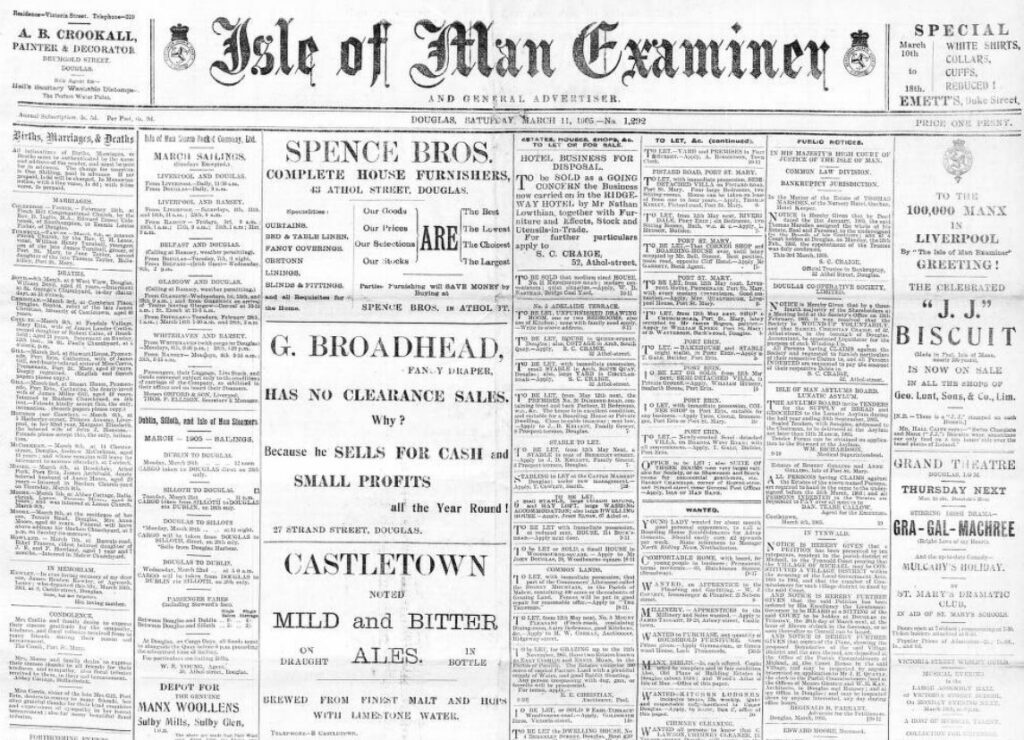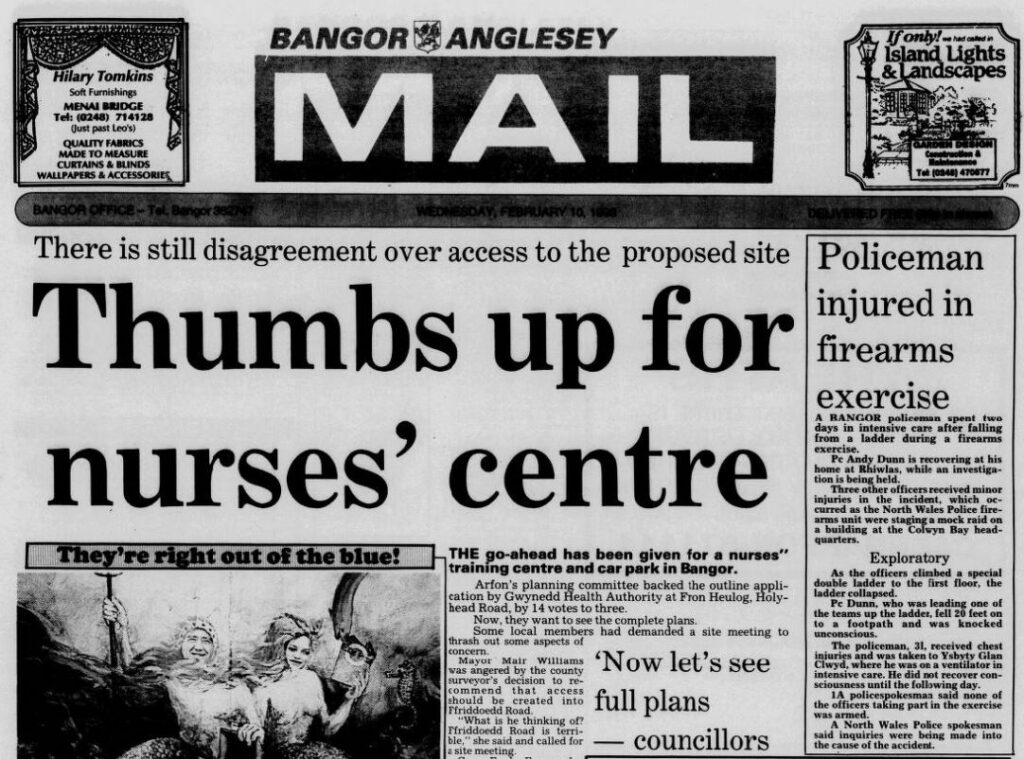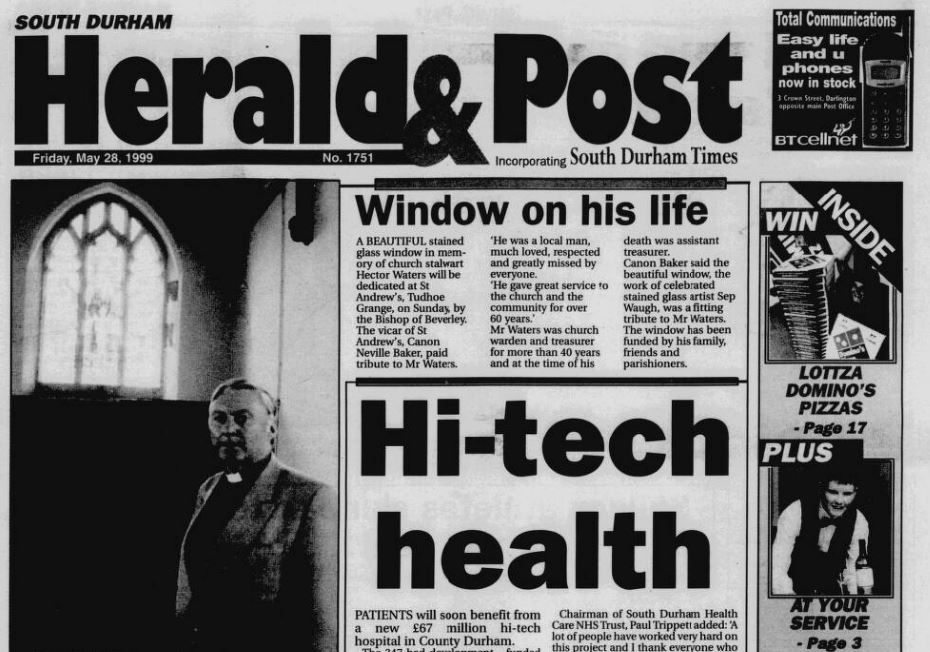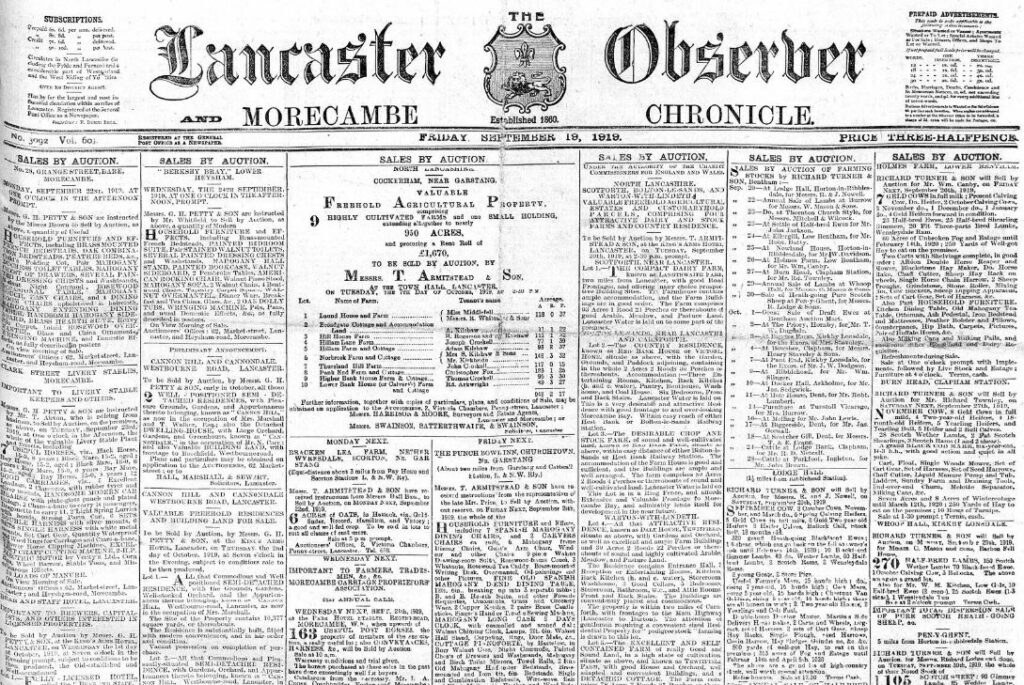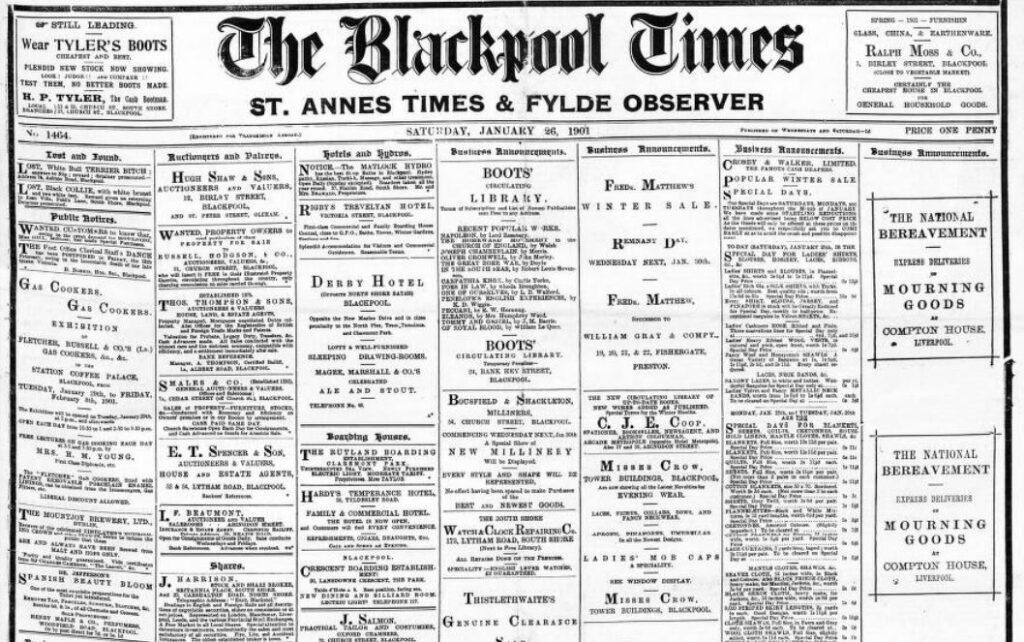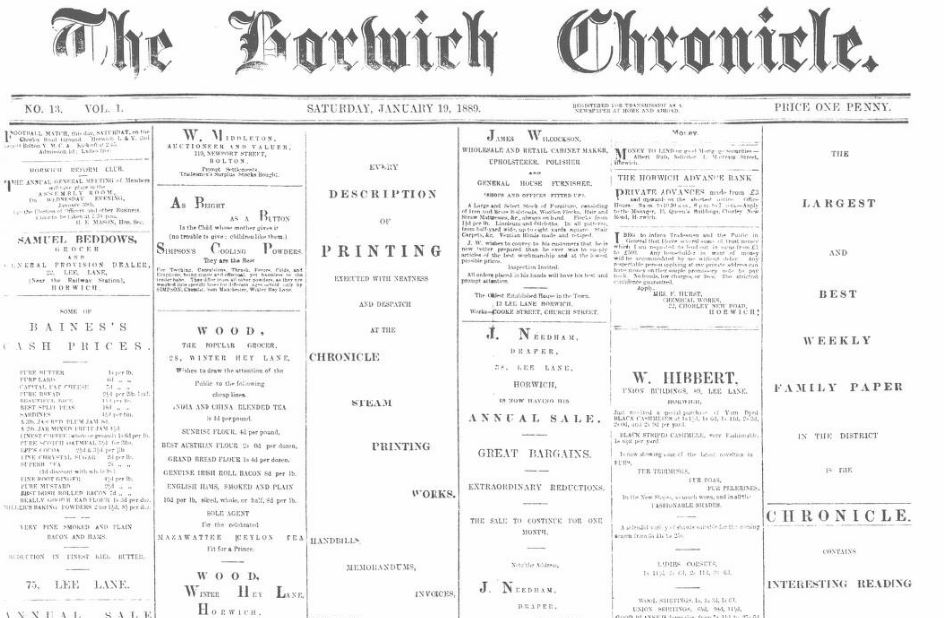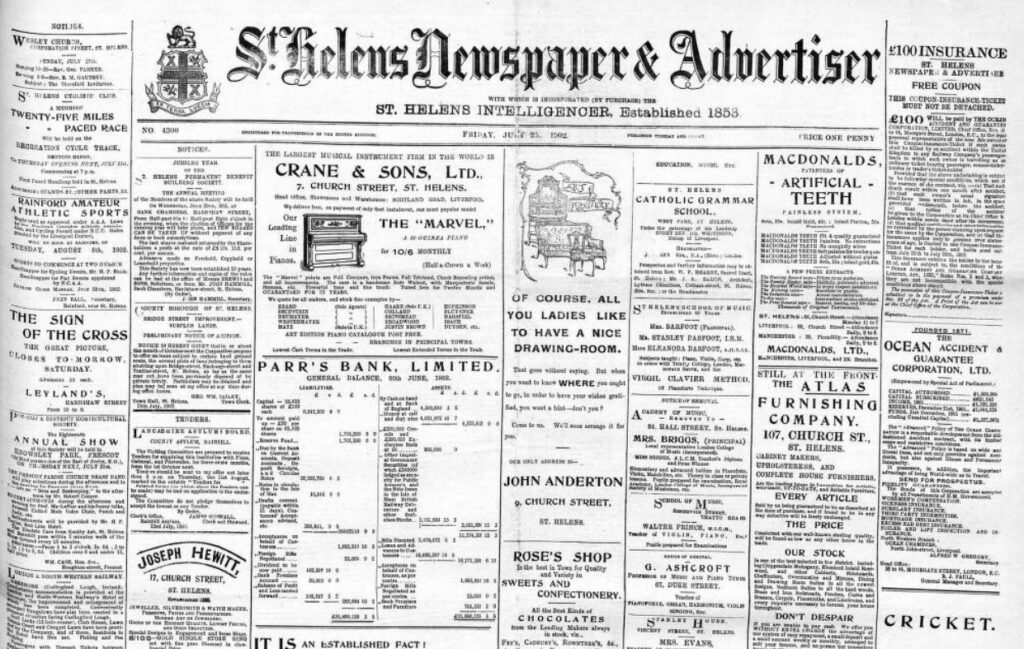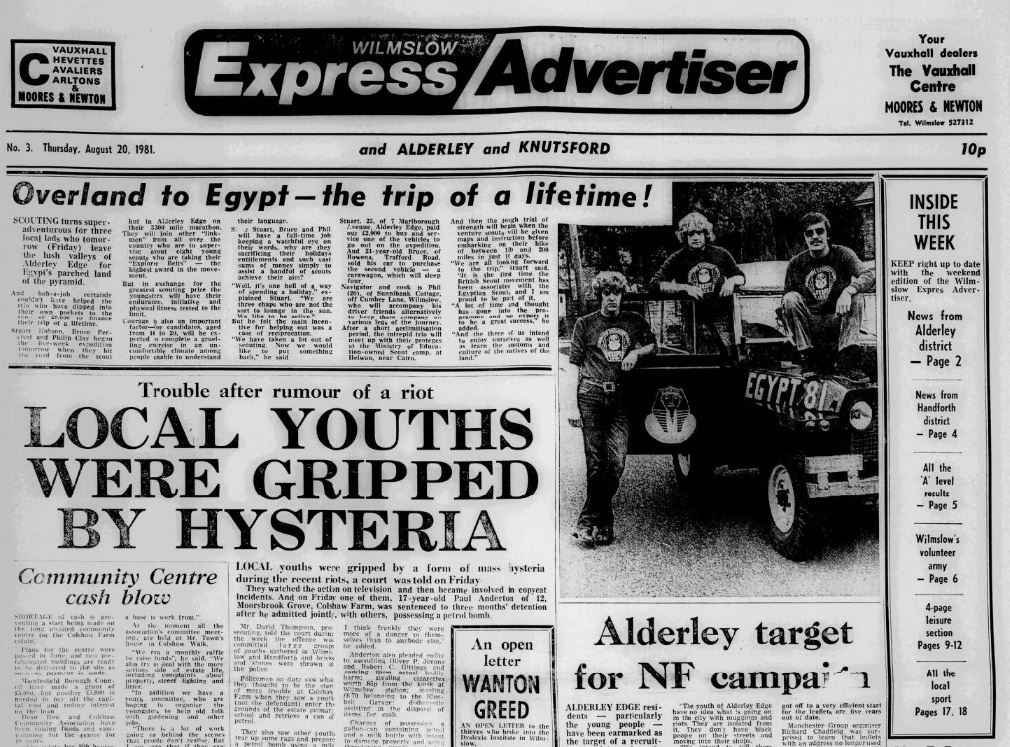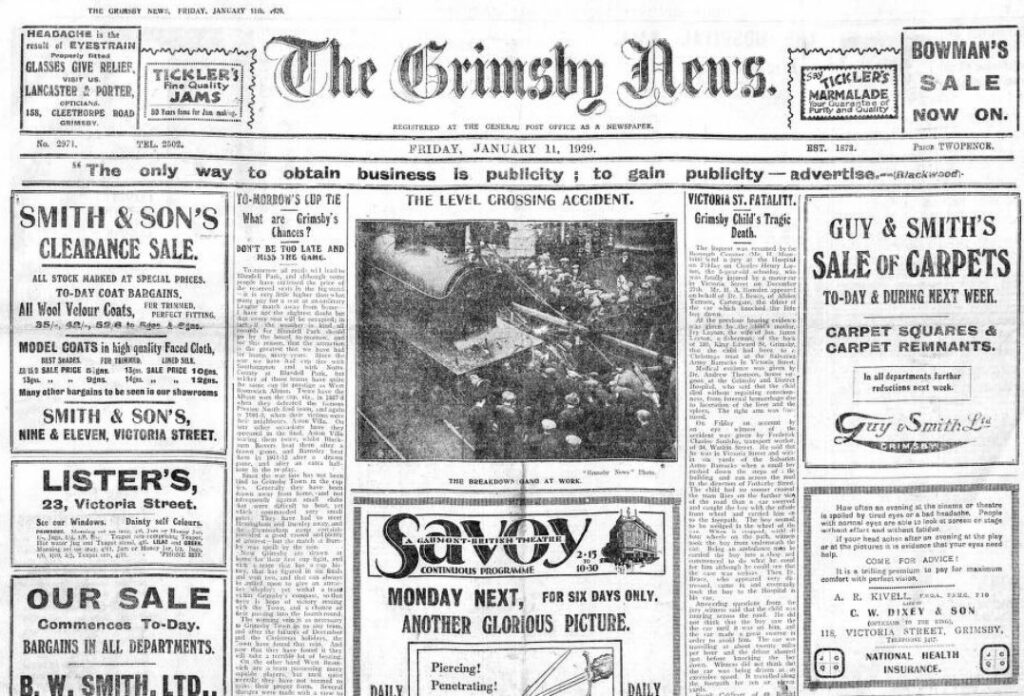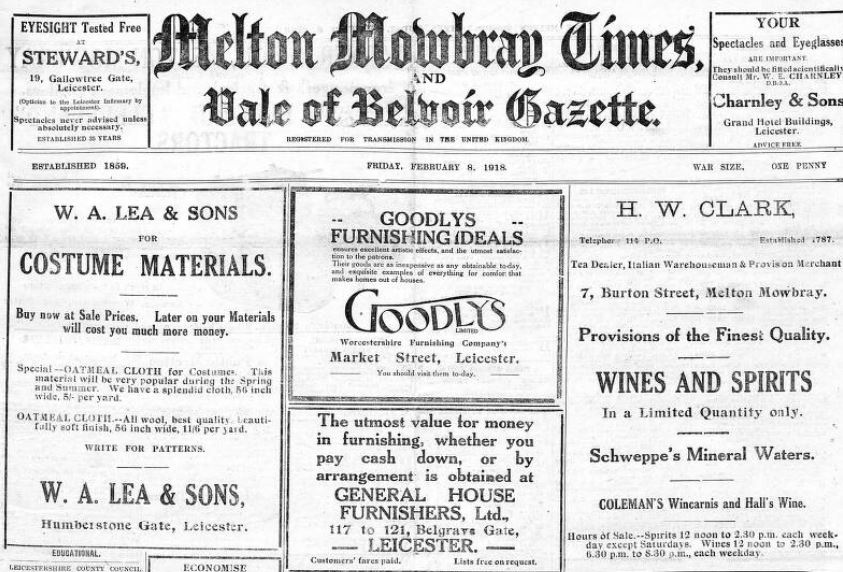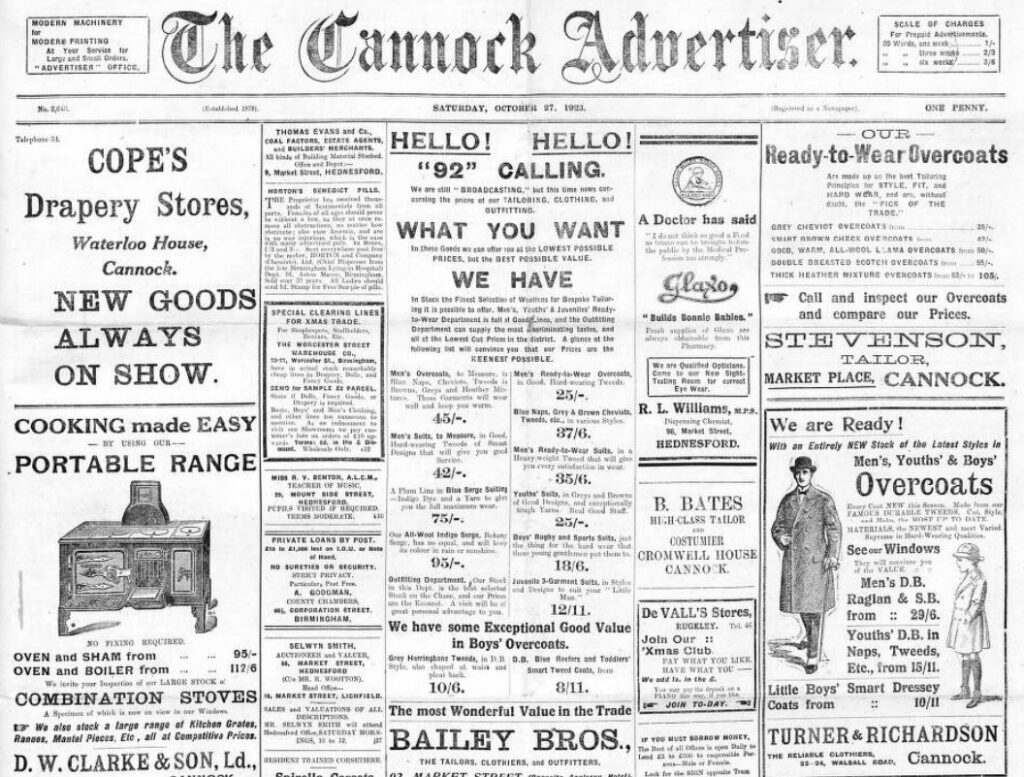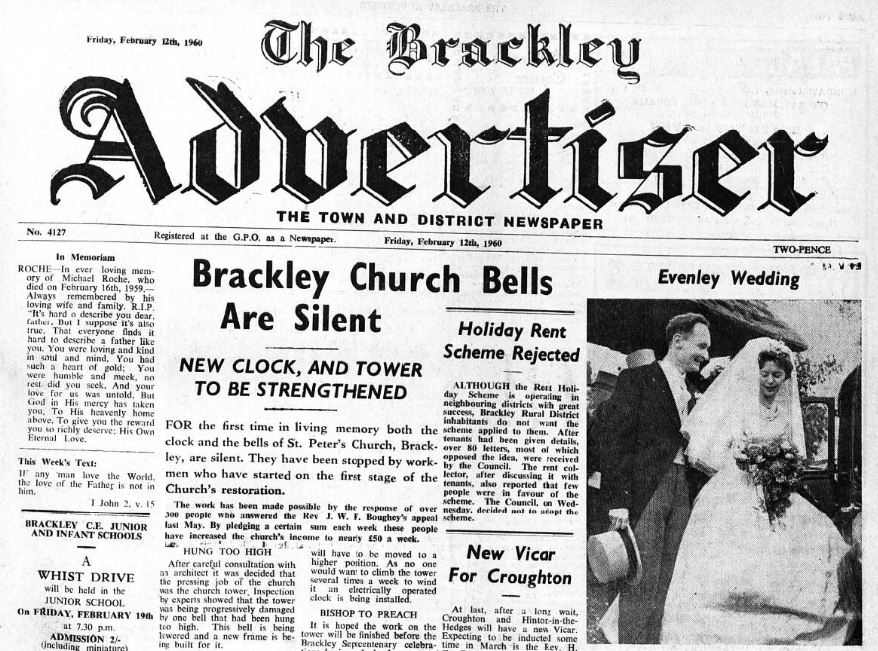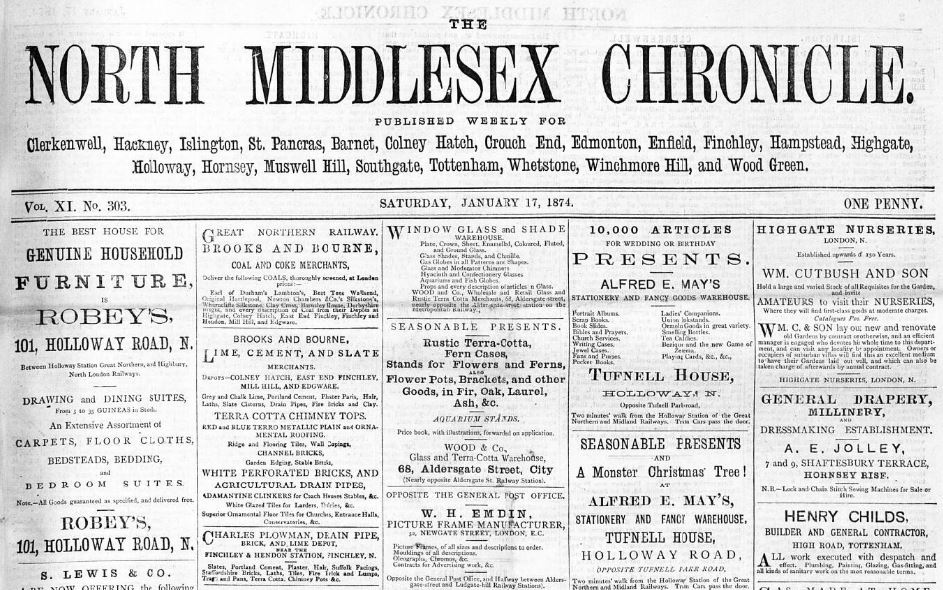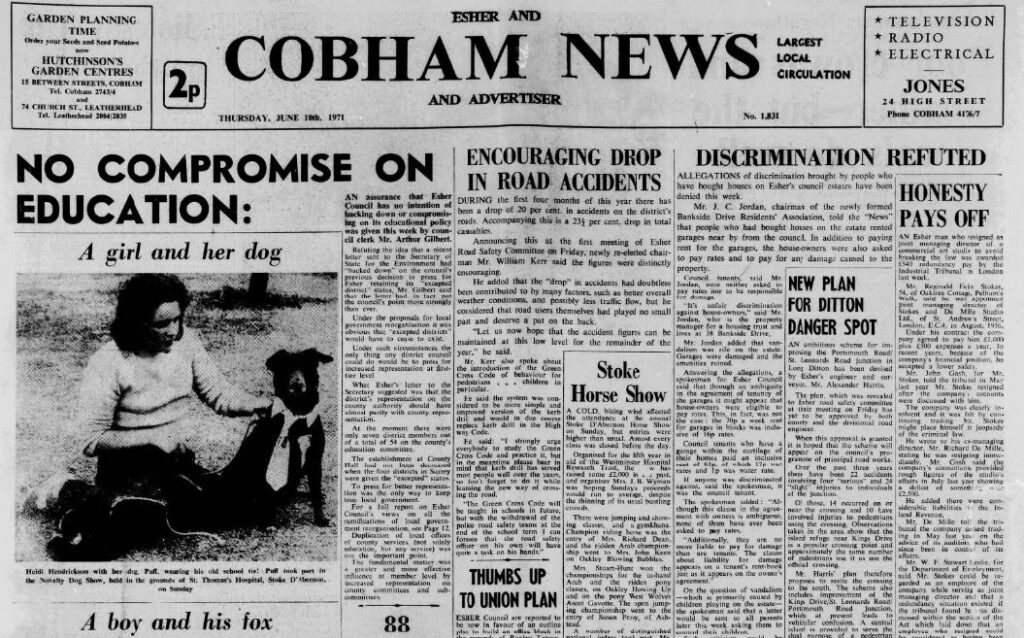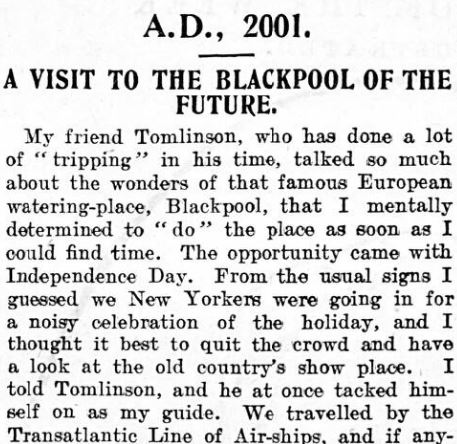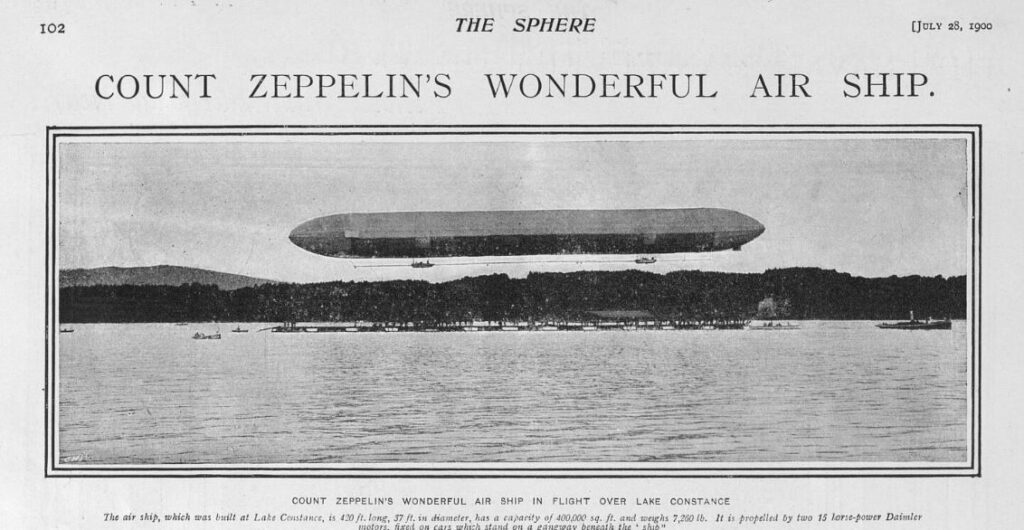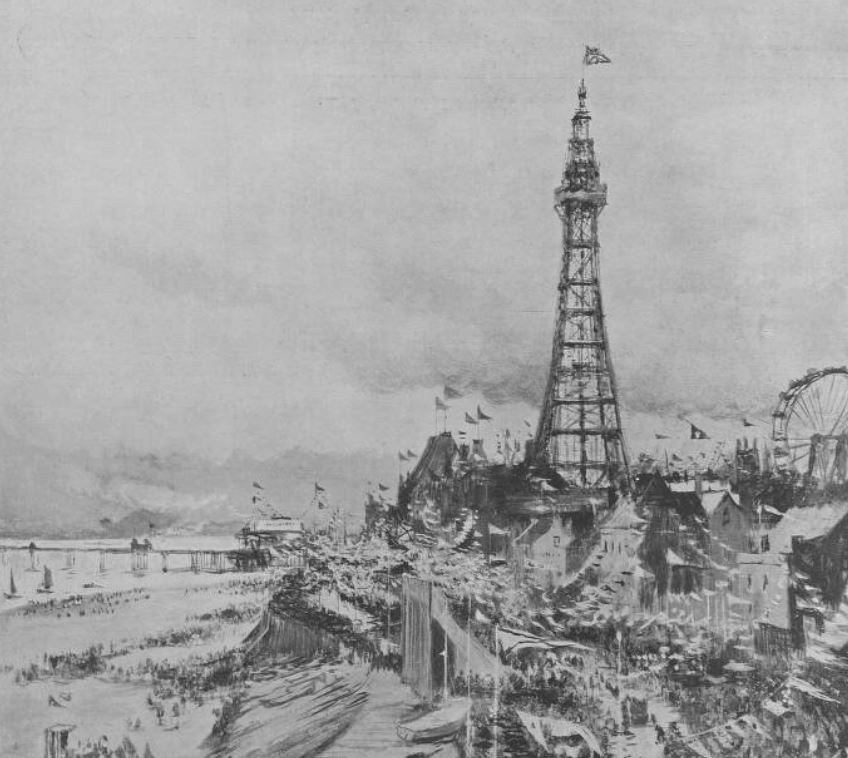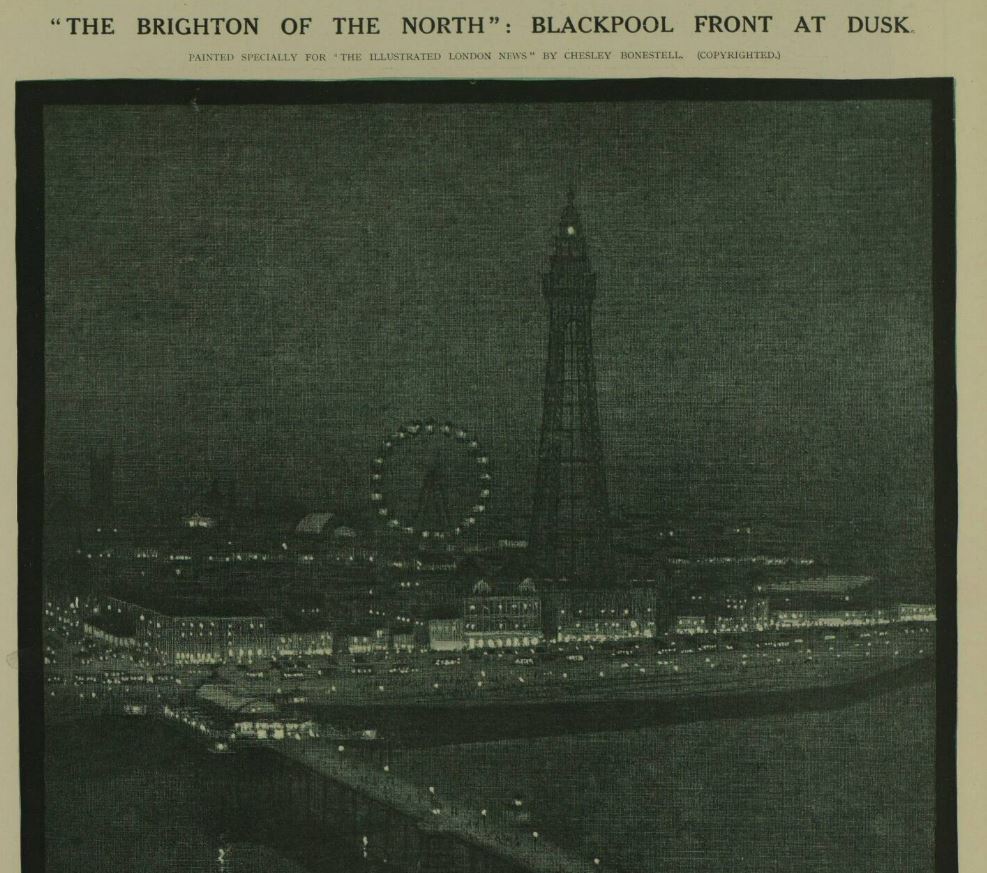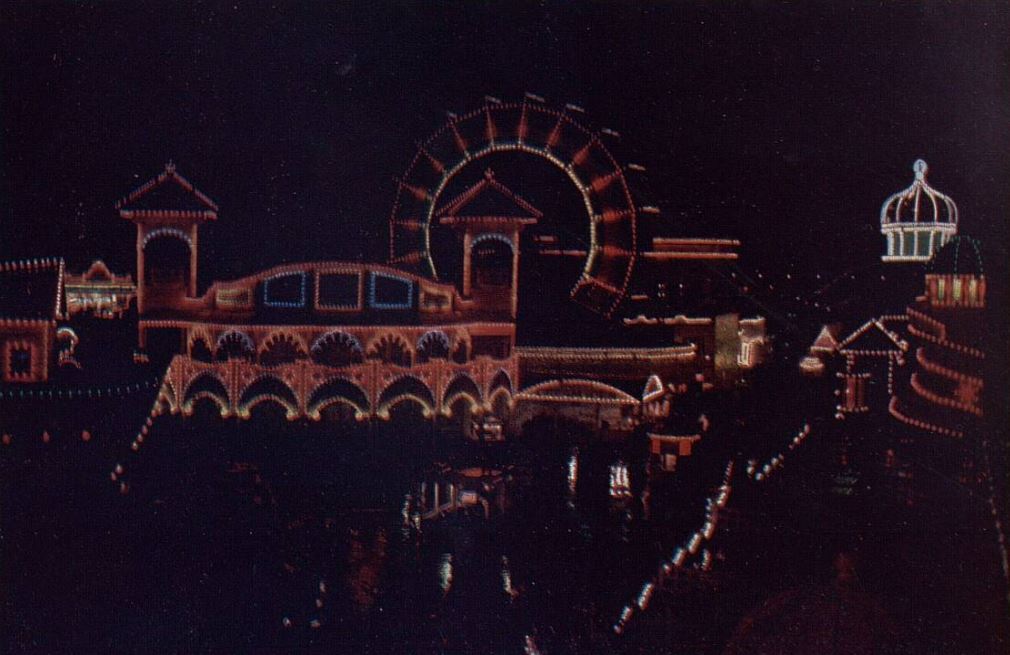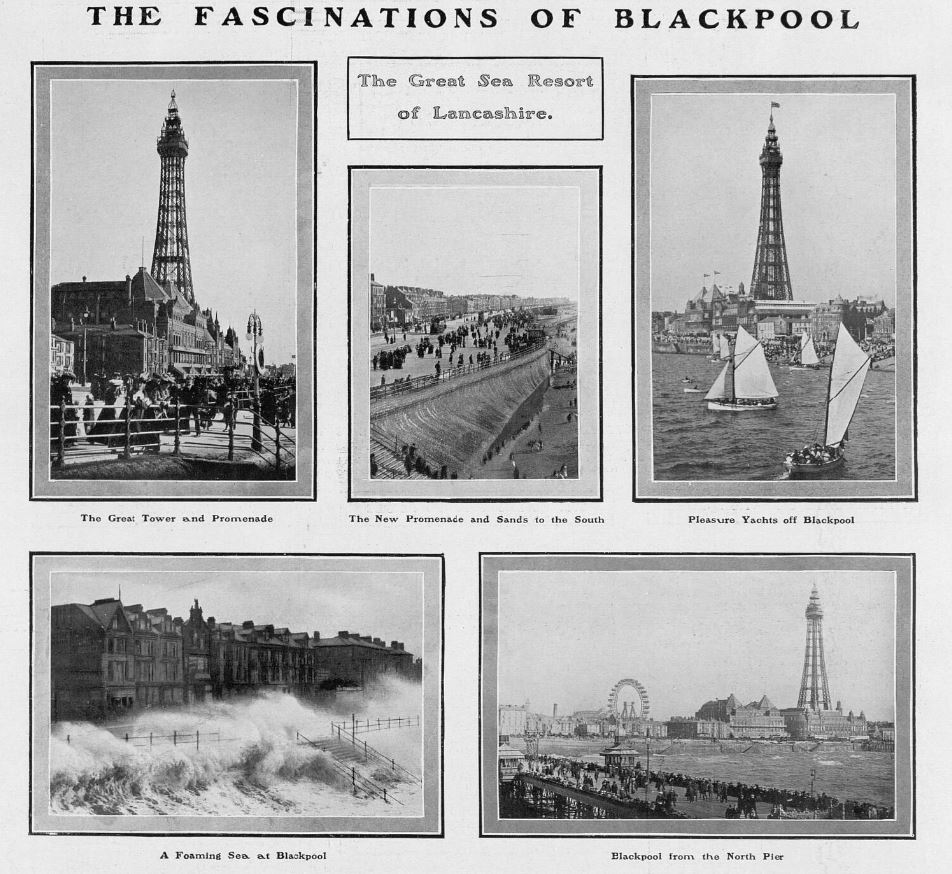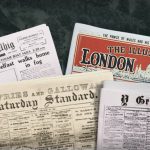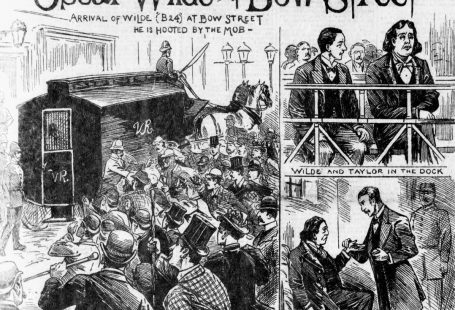This week at The Archive we have added 342,119 brand new pages, with fourteen brand new newspaper titles joining us from Blackpool to Bangor, from Cannock to Cobham, from the Isle of Man to Islington, with a particular focus on Lancashire. Meanwhile, we’ve updated 45 of our existing titles from across England, Wales and Scotland, as we’ve reached 63 million pages in total, all now available to search as part of our collection.
So read on to find out more about all of our new and updated titles of the week, and also to discover how journalists from over 120 years ago imagined a Blackpool of the future.
Register now and explore the Archive
But it is in the Isle of Man we start, as we begin our journey through our new titles of the week, and we’re delighted to introduce the Isle of Man Examiner to our collection of Manx newspapers. Established in 1880 in Douglas as the Isle of Man Examiner and General Advertiser, this newspaper was Liberal in its politics and was ‘devoted to insular and general news.’
Indeed, by the turn of the century the Isle of Man Examiner contained a wealth of news from the Crown Dependency, relaying reports from the Manx Electric Railway, the Lifeboat Services and the Dog and Poultry Show. Local deaths and accidents were reported on, as were ‘local people,’ with the newspaper containing details of those who had left the island. The newspaper, which appeared every Saturday at the cost of one penny, also contained extensive sporting news, with a particular focus on football and motor racing.
The Isle of Man Examiner would go on to be the island’s most popular newspaper in the twentieth century, and it was the biggest-selling newspaper on the Isle of Man. It is still published to this day in tabloid format, and now appears every Tuesday, with particular highlights being its business features and ‘Final Whistle’ sports column.
We travel almost due south from the Isle of Man now to Wales, to Bangor in particular, as we welcome the Bangor, Anglesey Mail to our collection of Welsh newspapers. This title was founded in Bangor in March 1984 as the Bangor & Anglesey Weekly News, becoming the Bangor & Anglesey Mail during the following year. A tabloid weekly newspaper, the Bangor, Anglesey Mail appeared every Wednesday and was distributed on the Bangor side of the Menai Strait in Gwynedd, incorporating the cathedral city of Bangor as well as the smaller neighbouring towns of Llanberis, Bethseda, Tal-y-bont and Llanddeiniolen.
In August 2011 the title became known simply as the Bangor Mail, and it made the unusual switch from being a freesheet to an entirely paid-for title.
We’re going to cross the Welsh border now and travel into England’s north-east as we introduce the South Durham Herald & Post to The Archive. Published in the new town of Newton Aycliffe, which lies five miles north of Darlington in County Durham, the South Durham Herald & Post was a weekly freesheet tabloid newspaper.
The title was distributed to homes in and around the southern areas of County Durham, covering the towns of Bishop Auckland, Spennymore, and of course, Newton Aycliffe. Published every Friday, the South Durham Herald & Post last appeared in 2009.
We travel east now as we introduce our very special Lancashire line-up of new titles, and what better way to start than in Lancaster, Lancashire’s county town, with the Lancaster Observer and Morecambe Chronicle. The Lancaster Observer and Morecambe Chronicle was established in 1860 as a politically independent newspaper, selling every Friday for one pence.
Circulating ‘through Arnside, Arkholm, Bentham, Barrow, Burton, Carnforth, Cartmel, Caton, Fleetwood, Galgate, Garstang, Grange-over-Sand, Holme, Hornby, Ingleton, Kirkby Lonsdale, Lancaster, &c,’ by the late 1880s the newspaper had a guaranteed weekly circulated of 8,500 copies. With a particular focus on local news, the Lancaster Observer reported from the local police courts and the quarter sessions, printing notices of births, marriages and deaths, and the latest from organisations in the area like the Tramways Company.
As well as featuring local news, the eight page Lancashire Observer dealt with national news, with a particular emphasis on the politics of the day. In 1944 the newspaper was incorporated by rival Lancaster title the Lancaster Guardian, which was founded in 1837.
From Lancaster now to perhaps Lancashire’s most famous and most visited town, Blackpool, and we’re delighted to welcome the Blackpool Times to The Archive. Founded in 1877 as the Blackpool Times and Fylde Observer, this Liberal newspaper circulated in ‘Blackpool, St. Anne’s-on-the-Sea, Poulton, Kirkham and the agricultural district of the Fylde.’ The local Blackpool issue of the Fleetwood Chronicle, the Blackpool Times filled eight pages and was a wonderfully rich and varied publication, with lively and informative reports and features.
The Blackpool Times contained local news from the town, reporting on, for example, the ‘Blackpool Improvement Bill,’ and featuring the latest from the Blackpool Town Council and the Blackpool School Board. Meanwhile, the newspaper reported on weddings in the town, as well as the contracts on offer by the town’s corporation. True to its position as one of the country’s premiere resorts, the Blackpool Times also advertised ‘Places of Amusement,’ detailing the entertainment on offer at the Winter Gardens, the Grand Theatre, and the Blackpool tower.
Furthermore, the Blackpool Times featured an array of special-interest features, looking at the ‘Latest in Science,’ ‘Bits from Books,’ and ‘Health and Home,’ the latter column featuring cookery hints and tips, as well as recipes. Within the newspaper you could also find a section dedicated to children, which featured stories and poetry, as well as a ‘London Letter,’ ‘Literary Notes and Notices,’ and ‘Personal Gossip.’ The Blackpool Times also featured illustrations, which accompanied its ‘Events of the Week’ section.
We remain in Lancashire for our next new title of the week, which is the Horwich Chronicle. This informative local newspaper was published in Horwich, a town which now lies in the Borough of Bolton, from 1888 onwards. Filling eight pages, the Horwich Chronicle appeared every Saturday at the cost of just one penny, detailing the local news from the likes of the Horwich Local Board, the Horwich Tradesman’s Association, as well as from the town’s churches.
Meanwhile, the Horwich Chronicle also featured a London letter, whilst it reported on national and international news. It featured serialised fiction, with several different stories appearing in one issue, as well as ‘Notes on Sport,’ ‘A Lady’s Letter,’ and ‘Market Reports.’
Another newspaper to be published in Lancashire was the local-focused St. Helens Newspaper & Advertiser, which was established in 1853. A Liberal newspaper, it circulated in the town of St Helens and its ‘neighbourhood,’ looking at local Lancashire issues such as ‘The Crowding Problem in Lancashire,’ ‘Breaches of Colliery Rules at Haydock,’ and the ‘South Lancashire Tramway.’
The St. Helens Newspaper & Advertiser also had a particular focus on ‘Sports and Pastimes,’ with sections devoted to football, racing, cricket and athletics. The newspaper provided ‘Hints from the Home,’ and printed serialised fiction by the likes of Raffles author E.W. Hornung. Within its pages you can also find obituaries for local residents, as well as reports on marriages in the town.
That’s it from our new Lancashire titles of the week, and we travel now into Cheshire to introduce the Wilmslow Express Advertiser to The Archive. A weekly freesheet tabloid serving the north east Cheshire town of Wilmslow, this newspaper was founded in 1981 as an amalgamation of the County Express and East Cheshire Observer, which was established in 1955, and the Wilmslow & Alderley and Knutsford Advertiser, which had begun life in 1874 as the Alderley & Wilmslow Advertiser.
And so for the first sixteen years of its life this title was known as the Wilmslow Express Advertiser, before it adopted the title of the Wilmslow Express in 1997. Appearing every Wednesday and Thursday, this newspaper is no longer in print.
We’re back to the east coast now as we welcome our next new title of the week, which is the Grimsby News. The Grimsby News was established in the port town of Grimsby, which lies in north east Lincolnshire, in 1874, as a Liberal weekly newspaper. Costing just one penny, it circulated in ‘Grimsby and the district,’ and was ‘specially devoted to the recording of local and district intelligence,’ as well as providing ‘a summary of general news.’
With a guaranteed weekly circulation of 7,300 copies by the late 1880s, the Grimsby News reported on local items like Grimsby’s Rabbit and Cavy Society, Grimsby Fish Market, coroners’ returns, the Grimsby Borough and Grimsby County Police Courts, ‘amusements’ in the town, and news from the dock. The newspaper had particular focus on commercial matters, detailing market news, as well as reporting on butter and egg imports, and the coal, timber and building trades.
We’re in the Midlands now, and we’re delighted to introduce the Melton Mowbray Times and Vale of Belvoir Gazette to our collection. This politically neutral title was established in the Leicestershire town of Melton Mowbray, which is famed for its pork pies, in 1859, and circulated in both ‘town and country.’
Appearing every Friday at the cost of just one penny, the Melton Mowbray Times featured local news from the surrounding towns of Wymondham, Queniborough, Syston, Goadby, Frisby-on-the-Wreake, Goadby, Twyford, Bagdale, Somerby, and Waltham, as well as publishing a ‘Ladies’ Letter.’ It is still running to this day as the Melton Times.
Next up is the Cannock Advertiser, an independent title that was founded in the Staffordshire town of Cannock in 1878. Appearing every Saturday, and costing one pence, the Cannock Advertiser filled four pages, and, true to its name, it featured a wealth of advertisements, which promoted everything from farm and garden produce, to furniture, houses and land.
Meanwhile, the Cannock Advertiser published a lengthy ‘In Memoriam’ section, as well as printing notices of births, marriages and deaths. The third page of the publication was given over to local news from the Urban District Council, the quarter sessions and the Cannock Petty Sessions, with headlines including ‘Purse Thefts at Cannock Market,’ ‘Bus Grievances,’ and ‘Council School and House Repairs.’
Another Advertiser to join The Archive this week is the Brackley Advertiser, which was established in the west Northamptonshire market town of Brackley in 1921 as a politically independent publication. Initially costing just one halfpenny, and appearing every Friday, by the 1960s this eight-page title cost two pence and featured a wealth of local news.
Accompanied by marvellous photographs, the Brackley Advertiser reported on local weddings and newly-born babies, publishing notices of births, marriages and deaths, as well as recording milestones like golden wedding anniversaries. The Brackley Advertiser also took a look at sport in the area, detailing the results from local football leagues, as well as featuring a ‘situations vacant’ column, and reports from local businesses and markets.
Our penultimate new title of the week hails from the nation’s capital and is the North Middlesex Chronicle, which was established in 1868 in Islington. A Liberal title, the North Middlesex Chronicle was ‘published weekly for Clerkenwell, Hackney, Islington, St. Pancras, Barnet, Colney Hatch, Crouch End, Edmonton, Enfield, Finchley, Hampstead, Highgate, Holloway, Hornsey, Muswell Hill, Southgate, Tottenham, Whetstone, Winchmore Hill, and Wood Green.’
A thorough local newspaper serving North London, the North Middlesex Chronicle appeared every Saturday at the cost of one pence. Filling eight pages, it reported on news from the Highgate Petty Sessions, from the 14th Middlesex Volunteers, from the Edmonton Petty Sessions, and from Edmonton Grammar School. It contained a correspondence section, as well as a column devoted to ‘Wit and Humour.’
Our final new title of the week is the Cobham News and Advertiser, which was also known as the Esher & Cobham Advertiser. Serving the large village of Cobham, and the outlying London suburb of Esher, the Cobham News & Advertiser appeared every Thursday and claimed to have the ‘largest local circulation’ out of its rivals.
That’s it from our fourteen new titles of the week, but we have also updated 45 of our existing titles from across England, Wales and Scotland. Highlights include the over 105,000 brand new pages that we have added to the Hull Daily Mail, whilst over 34,000 brand new pages have joined the Bristol Evening Post. This week also sees significant updates to the Lincolnshire Echo, the Sunday Sun (Newcastle), the Sandwell Evening Mail.
We’ve also added new pages to some of our Scottish newspaper titles, namely the Ayrshire Post and the Irvine Herald, whilst we have updated a duo of Welsh publications, the Llanelli Star and the South Wales Echo.
A Visit to the Blackpool of The Future
As the new year of 1901 dawned, writers at our new Lancashire title the Blackpool Times looked to the future, and wondered what the town might look like in one hundred years, in 2001. To that end, the newspaper published a piece entitled ‘A.D., 2001 – A Visit to the Blackpool of the Future,’ where an unnamed traveller visits Blackpool.
The piece is an illuminating glimpse at how people from over 120 years ago imagined the future, from the types of transport that would be available, to how laws might have changed over the years. The piece begins by introducing the traveller’s friend Tomlinson, who had ‘talked so much about the wonders of that famous European watering-place, Blackpool,’ that the pair decided to visit from their home in New York.
To get from New York to Blackpool, Tomlinson and his friend travelled by the ‘Transatlantic Line of Air-ships.’ In 1901 the Zeppelin was a recent invention, and the Blackpool Times writer imagines that this latest of transport innovations would still be in use some one hundred years later. And so Tomlinson and his friend left by the ‘6.15 am New York to Pekin ship, which makes a special stop at England, or any other point, as required,’ with the airship due to arrive at Blackpool at 9.30 am.
But on the way, as the airship passed over Ireland, the journey was paused so that the ‘mails’ could be exchanged. Our traveller narrates the scene:
…on looking over the side I saw on the other British Government’s ships coming up. In a second or so she was alongside, taking off the Irish letter-sacks and loading us with the Eastern mails.
‘That old custom shows no sign of dying out,’ said Tomlinson, taking stock of the number of bags.
‘No,’ I replied. ‘They said the universal telephotoscope was going to do away with written communications; but it is wonderful what a lot of people seem to be able to express themselves better in writing than at the instrument.’
The importance of the written word to our 1901 writer is evident, with other inventions being unable to better the letter.
And after the pause over Ireland, our travellers arrived at Blackpool, where they descended ‘in the direction of a really smart, imposing stretch of town.’ Meanwhile, Tomlinson outlined to his friend the value of land in Blackpool:
‘We don’t alight on the this side for a very good reason,’ said Tomlinson. ‘Land’s too valuable. We talk of big prices in New York, but they top us here. You see that Moorish building standing between the fifth and sixth Piers. That’s the Regency Bathing Palace. The company had to pay half-a-million for land alone, and much higher prices have been paid for land nearer the centre of the Esplanade.’
Blackpool’s famous tower still stands, which Tomlinson says is ‘re-gilded every year,’ and once the pair land they board ‘a tram – a marvellous vehicle which showed no evidence of propulsion – and proceeded towards the sea.’ They then exited near ‘what Tomlinson called Dickinson Boulevard,’ homage to Blackpool’s Dickinson Road, which runs behind the seafront, and headed to the Royal Restaurant for food.
Once at the ‘palatial building,’ Tomlinson and his friend dine on ‘globules of fish and steak,’ whilst being lulled by ‘sweet music…played by some invisible performers.’ Blackpool seems like a heavenly utopia, with all restaurants being operated by ‘the Corporation.’
After lunch, the pair head to the Zoological Gardens, no doubt based on Blackpool’s Menagerie and Aquarium, which was opened in 1873. Tomlinson’s friend remarks how ‘splendid’ the place is, and Tomlinson replies:
‘You ought to come at night when the electric illuminations and the kaleidoscopic fountains are on. You would say it was splendid then.’
‘Is it always as busy as this?’ I asked. Tomlinson laughed.
‘Why, the few thousand present now are as nothing to what there will be later on in the day and night. It is estimated that quite half-a-million people visit the Gardens daily during the season – that is from March to November!’
After visiting the zoo, the duo from New York ‘sat down in an Arabesque Kiosk opposite the Municipal Palace of Entertainment.’ Tomlinson’s friend asks if there are any bars in Blackpool, to which his guide replies:
‘Yes, there are bars of both kinds; but no one is allowed more than one alcoholic drink. This system has been found to work wonderfully well and it is now in vogue at all Corporation places of entertainment.’
And after this day, which was spent ‘like a day in the dream,’ the pair left Blackpool at 7pm, returning to New York at 10.20pm, ‘which Tomlinson said was very good time for a night run.’
Not only do our newspapers provide a wonderful vision of our past, they also inform us as to what people from the past expected their future to be like. In Blackpool’s case, it was envisioned to be a kind of utopia, easily accessible from the other side of the Atlantic.
New Titles
| Title | Years Added |
| Bangor, Anglesey Mail | 1993 |
| Blackpool Times | 1901-1902, 1904, 1918-1919, 1933 |
| Brackley Advertiser | 1960 |
| Cannock Advertiser | 1923 |
| Cobham News and Advertiser | 1970-1971 |
| Grimsby News | 1904, 1906, 1908, 1916-1917, 1923, 1928-1930, 1935 |
| Horwich Chronicle | 1889 |
| Isle of Man Examiner | 1905, 1916 |
| Lancaster Observer and Morecambe Chronicle | 1919 |
| Melton Mowbray Times and Vale of Belvoir Gazette | 1918 |
| North Middlesex Chronicle | 1874, 1880, 1889, 1899 |
| South Durham Herald & Post | 1999 |
| St. Helens Newspaper & Advertiser | 1902-1903, 1916, 1918-1919 |
| Wilmslow Express Advertiser | 1981 |
Updated Titles
This week we have updated 45 of our existing titles.
You can learn more about each of the titles we add to every week by clicking on their names. On each paper’s title page, you can read a FREE sample issue, learn more about our current holdings, and our plans for digitisation.
You can keep up to date with all the latest additions by visiting the recently added page. You can even look ahead to see what we’re going to add tomorrow.


